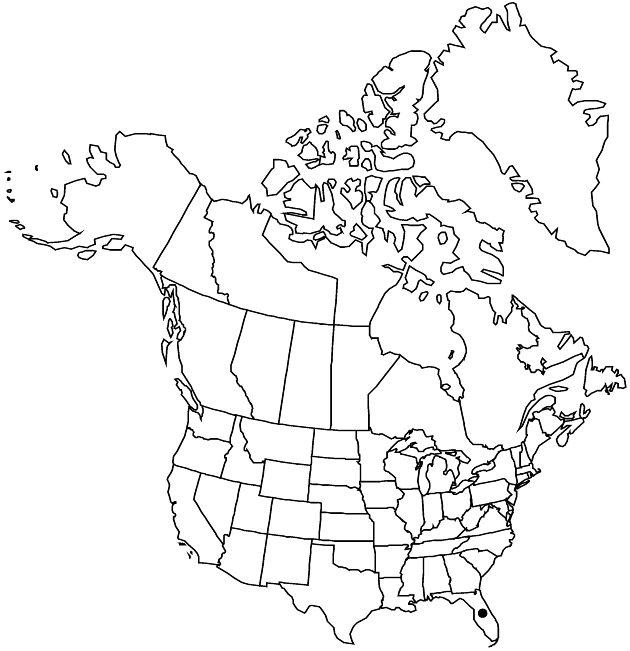Difference between revisions of "Mikania batatifolia"
in A. P. de Candolle and A. L. P. P. de Candolle, Prodr. 5: 197. 1836 (as batataefolia).
FNA>Volume Importer |
TammyCharron (talk | contribs) |
||
| (7 intermediate revisions by 2 users not shown) | |||
| Line 1: | Line 1: | ||
{{Treatment/ID | {{Treatment/ID | ||
|accepted_name=Mikania batatifolia | |accepted_name=Mikania batatifolia | ||
| − | |accepted_authority= | + | |accepted_authority=de Candolle |
|publications={{Treatment/Publication | |publications={{Treatment/Publication | ||
|title=in A. P. de Candolle and A. L. P. P. de Candolle, Prodr. | |title=in A. P. de Candolle and A. L. P. P. de Candolle, Prodr. | ||
| − | |place=5: 197. 1836 | + | |place=5: 197. 1836 (as batataefolia) |
|year=1836 | |year=1836 | ||
}} | }} | ||
| Line 22: | Line 22: | ||
|habitat=Woodlands, savannas, salt marshes, swamps, usually in oölite or coral soils | |habitat=Woodlands, savannas, salt marshes, swamps, usually in oölite or coral soils | ||
|distribution=Fla.;West Indies (Bahamas;Cuba). | |distribution=Fla.;West Indies (Bahamas;Cuba). | ||
| − | |discussion=<p>J. K. Small (1933), B. L. Robinson (1934), R. W. Long and O. Lakela (1971), and W. C. Holmes (1981, 1993) recognized Mikania batatifolia. Hn. Alain (1962) referred M. batatifolia to M. micrantha Kunth, a common, polymorphic taxon of humid American tropics. A. Cronquist (1980) merged M. batatifolia with M. scandens. In reexamining the members of the M. scandens complex, which includes M. batatifolia (Robinson), it is apparent that M. batatifolia is distinct. Differences with M. scandens, including chemical evidence, were cited by Holmes (1981). For additional information, see Holmes (1981, 1993).</p> | + | |discussion=<p>J. K. Small (1933), B. L. Robinson (1934), R. W. Long and O. Lakela (1971), and W. C. Holmes (1981, 1993) recognized <i>Mikania batatifolia</i>. Hn. Alain (1962) referred <i>M. batatifolia</i> to <i>M. micrantha</i> Kunth, a common, polymorphic taxon of humid American tropics. A. Cronquist (1980) merged <i>M. batatifolia</i> with <i>M. scandens</i>. In reexamining the members of the <i>M. scandens</i> complex, which includes <i>M. batatifolia</i> (Robinson), it is apparent that <i>M. batatifolia</i> is distinct. Differences with <i>M. scandens</i>, including chemical evidence, were cited by Holmes (1981). For additional information, see Holmes (1981, 1993).</p> |
|tables= | |tables= | ||
|references= | |references= | ||
| Line 31: | Line 31: | ||
-->{{#Taxon: | -->{{#Taxon: | ||
name=Mikania batatifolia | name=Mikania batatifolia | ||
| − | + | |authority=de Candolle | |
| − | |authority= | ||
|rank=species | |rank=species | ||
|parent rank=genus | |parent rank=genus | ||
| Line 45: | Line 44: | ||
|publication year=1836 | |publication year=1836 | ||
|special status= | |special status= | ||
| − | |source xml=https:// | + | |source xml=https://bitbucket.org/aafc-mbb/fna-data-curation/src/2e0870ddd59836b60bcf96646a41e87ea5a5943a/coarse_grained_fna_xml/V19-20-21/V21_1388.xml |
|tribe=Asteraceae tribe Eupatorieae | |tribe=Asteraceae tribe Eupatorieae | ||
|genus=Mikania | |genus=Mikania | ||
Latest revision as of 19:32, 5 October 2022
Stems obscurely 6-angled, sometimes winged on angles, often densely glandular, glabrous or puberulent; internodes 3.5–13 cm. Petioles 10–40 mm, glabrous, glandular. Leaf blades deltate-ovate, 1.5–6 × 1–5 cm, (subcoriaceous to somewhat fleshy) bases cordate to subcordate, margins usually hastately dentate to ± lobed (lobes divergent), apices acute to acuminate, faces glabrous (and gland-dotted). Arrays of heads corymbiform, 2–4 × 2–6 cm. Heads 4–6 mm. Phyllaries lanceolate to narrowly ovate, ca. 3.5 mm, apices acuminate (abaxial faces puberulent). Corollas white, ca. 3 mm, gland-dotted, lobes deltate. Cypselae brown, 1.5–2 mm, densely gland-dotted; pappi of ca. 40 white, barbellate bristles ca. 3 mm.
Phenology: Flowering year round.
Habitat: Woodlands, savannas, salt marshes, swamps, usually in oölite or coral soils
Distribution

Fla., West Indies (Bahamas, Cuba).
Discussion
J. K. Small (1933), B. L. Robinson (1934), R. W. Long and O. Lakela (1971), and W. C. Holmes (1981, 1993) recognized Mikania batatifolia. Hn. Alain (1962) referred M. batatifolia to M. micrantha Kunth, a common, polymorphic taxon of humid American tropics. A. Cronquist (1980) merged M. batatifolia with M. scandens. In reexamining the members of the M. scandens complex, which includes M. batatifolia (Robinson), it is apparent that M. batatifolia is distinct. Differences with M. scandens, including chemical evidence, were cited by Holmes (1981). For additional information, see Holmes (1981, 1993).
Selected References
None.